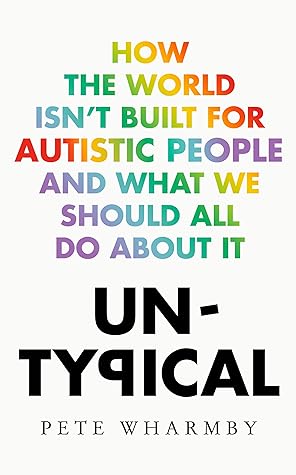More on this book
Community
Kindle Notes & Highlights
by
Pete Wharmby
I’ve been autistic all my life.
we’re born autistic, live autistic and die autistic.
This isn’t ‘phobia’, nor is it anxiety – it’s a manifestation of disability and as such, understanding and adjustment are absolutely vital.
The problem is that autistic people don’t get the healthcare they need, and this is something that contributes considerably to our lower-than-average life expectancies, often in quite unexpected ways.
Honestly, it’s a wonder that I’m still alive.
In fact, for most autistic adults there’s no post-diagnostic support of any kind.
The sad truth is the NHS offers no ongoing support for autistic adults unless they have comorbidities like learning disabilities – and even then the support is gatekept harshly and often unfairly.
Rates of unemployment, homelessness and suicide among autistic adults are sky high
Figuring out that a combination of ghost and psychic type moves on a fully powered-up Mewtwo will make it essentially unbeatable in competitive play is, quite simply, fun – as well as being an achievement of sorts.
There’s next to zero support available for the vast majority of autistic adults. Despite depression and suicidal ideation being a big part of the reason why I received a diagnosis of autism back in 2017, I’ve been given no support from the NHS since my diagnosis, having been sent on my way with a handful of mediocre pamphlets and a ‘good luck’ from the psychiatrist. We’re left to try to figure it all out on our own, and if it hadn’t been for the supportive network of autistic people online I fear my own personal outcome may have been bleaker.
This is the ironic and, let’s face it, pretty awful truth behind masking. It causes us harm, and by rights we shouldn’t have to do it, but with the way the world is currently set up we simply have to mask. In doing so, however, we literally destroy our ability to do so. We may then lose our job, we may lose our family.
Never curtail an autistic person’s access to their interests. Do not view these interests as merely hobbies, nor the autistic person as ‘entitled’ or ‘bratty’
After all, too many autistic people who want to work, and are physically able to do so, are out of work. This means we’re much less able to support ourselves and live an independent life, and often all because our behaviour is just that tiny bit different from the established norm. Thousands if not millions of individuals are struggling to get by because too many employers lack any kind of understanding of what autism is. This is not a problem with the autistic community; it’s a problem with the work community.
it’s almost as if job interviews are actively stacked against autistic people, when you look at them like that. Often it feels like you’re being interviewed to see how much of a great buddy you’ll be in the office, rather than for your skills and competence at the job,
The fact is, if a person is autistic, there’s a fairly good chance they might be ADHD too (and if you’re feeling expansive, feel free to throw dyslexia, dyscalcula and dyspraxia in there too).
‘Stimming’ is an informal term that the autistic community seems to have agreed fits our need.
It describes the physical and sometimes verbal actions that many, if not most, autistic people will utilise to help regulate our mood, rather like a safety valve that allows a release of pressure.
We don’t like difference, so autistic people learn very quickly (and often painfully) that their stims are not welcome here. Learning less obvious stims, or only stimming in private, becomes yet another aspect of autistic masking. And we all know how that eventually turns out.
Stimming is an integral part of autistic life, and one that’s too often crushed and wrecked by neurotypical expectations.
the concept of setting a goal five years hence and steadily working towards it is as fanciful to me as the concept of setting off on a quest to drop a magic ring into a volcano.
Much is made of how a lot of autistic and ADHD people end up doing the bulk of their work – whatever it may be – just before deadline hits, and I wonder if this is the reason.
After all, how can you plan for a future that you literally cannot conceptualise? I wonder how many autistic or ADHD people would agree.


